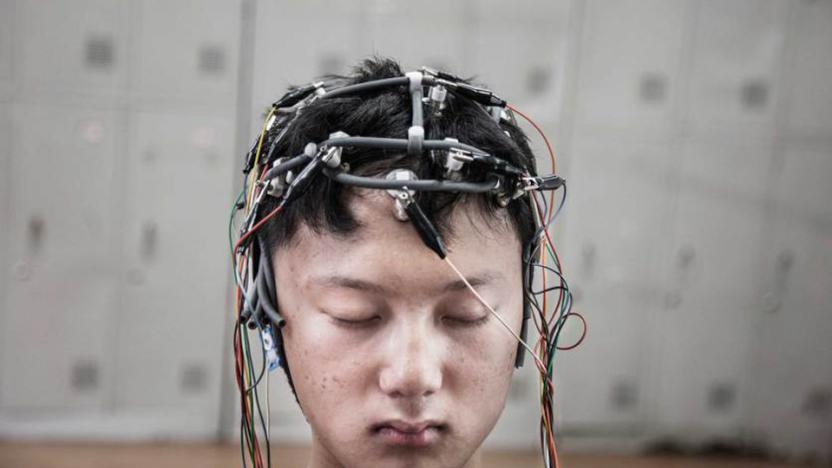addiction
Latest

The WHO may add video games to its list of recognized addictions
The World Health Organization's ICD, or International Classification of Diseases, is used by medical professionals, scientists, researchers and more to define and classify diseases around the world. It's currently in its 10th revision (ICD-10), but the 11th revision has been in the works for years. Now, a draft for the ICD-11 has been released online (the final version is due in 2018), and it recognizes video game addiction on its list of conditions.

Kick your smartphone habit with the 'Substitute Phone'
Cigarettes are hard to kick not just because of the nicotine, but the fact that they give you something to do with your hands. The "Substitute Phone" from Vienna-based designer Klemens Schillinger works on the same principle, if you think of content as the drug and your phone's touchscreen as the tactile addiction. The five models look and feel like a phone, but instead of a screen, there are stone beads embedded in slots at various angles. You can just grab it and swipe, pinch and scroll, satisfying that physical need without the nicotine/content.

Can tech replace painkillers?
Jennifer Kain Kilgore was 17 when she had her first car accident. A high school senior, she was driving with her mother and aunt for a college visit to Georgetown University in Washington, D.C., when their car -- stopped on the highway in a line of traffic -- was rear-ended by another driver speeding toward them at 65 miles per hour. Her spine was broken in four places. Nearly 10 years later, history repeated itself. Jennifer was waiting at a red light when she was rear-ended. Her old injuries were inflamed while new ones left her with all-encompassing, shooting pain. Despite a decade bookended by accidents, Jennifer, now 30, nevertheless hit milestone after milestone. Through surgeries and physical therapy, she went on to graduate from college and law school, worked as an attorney in the Boston area, got married and published her work as a legal consultant, blogger and freelance writer, sharing her personal experiences with readers who connected with her personal story. But throughout all of this, she lived with one horrible constant: chronic, often debilitating pain. After her second accident, she made the decision to leave her law firm job and work from home as a freelancer.

FDA OKs first implant treatment for opioid addiction (updated)
That small stick in the image above might look like a fat toothpick or a part of a toy that broke off, but its much, much more than that. It's called Probuphine, and it's the first implant treatment for opioid addiction that got the FDA's blessing. Opioid dependence is a huge problem today, especially since opioids encompass not just illegal substances like heroin, but also legal pain killers, such as those prescribed after surgery.

New York prescriptions go digital to combat opioid abuse
On March 27th, New York State residents will no longer need to decipher their doctor's terrible handwriting, thanks to a switch from paper to electronic prescriptions. The new phase is part of a 2012 law called I-Stop aimed at slowing the massive prescription medication addition problem. According to the state officials, the number of deaths related to Oxycodone, Hydrocodone and other opioid meds nearly quadrupled to 1,227 between 2004 and 2013.

Man sues Bethesda over his 'Fallout 4' addiction
There's little doubt that Fallout 4's gameplay is involving when you can spend dozens of hours on the main storyline alone. However, one Russian man is convinced that it's too involving. RT says that he's suing Bethesda for 500,000 rubles ($7,030) for failing to warn that Fallout 4 would "become so addictive." Supposedly, the man went on a 3-week gaming marathon that cost him his health, job and wife. Had he known how alluring it was, he says, he would have either waited until the holidays to buy the game or avoided it entirely. We've reached out to Bethesda to both confirm the lawsuit and get its take on the claims.

Dear Veronica: My video game addiction
#fivemin-widget-blogsmith-image-919275{display:none;} .cke_show_borders #fivemin-widget-blogsmith-image-919275, #postcontentcontainer #fivemin-widget-blogsmith-image-919275{width:570px;display:block;} try{document.getElementById("fivemin-widget-blogsmith-image-919275").style.display="none";}catch(e){} Boy... I asked about weird places you guys have overheard cellphone conversations, and you did not disappoint in your responses! From asbestos-filled crawlspaces to family wakes, there are some pretty weird people out there that need, NEED, to take their call right that moment. Speaking of addiction, we have a great question from a viewer about video games! Since I'm not qualified to speak as a doctor (and as a highly-functioning video game addict myself) I've brought on Dr. Anthony Bean to fill you in. Then I proceed to answer two more questions about video games, so I guess I'm just an enabler. Keep sending in those question to me via email, and on Twitter using the hashtag #DearVeronica! You can also subscribe in iTunes and by RSS. See you next time!

The Big Picture: Monitoring the brains of online game addicts
Online game addiction is a real problem, and some countries are willing to take drastic measures to get these players living a healthier lifestyle. Need proof? Just look up. Photographer Fernando Moleres recently visited an internet gaming rehab camp in Beijing, and saw the facility monitoring the brain activity of addicts using the elaborate device you see above -- the camp wants to see that your mind is changing. The facility also relies on a mixture of medicine, military social structure and psychotherapy to set patients straight. It's hard to know if these "tough love" measures are truly effective, but their very existence reveals just how widespread compulsive gaming has become.

Doctors report a case of Google Glass addiction
You've probably heard of Google Glass owners who seemingly can't put the wearable down, but there's now at least one reported instance of genuinely addictive behavior. Doctors at Naval Medical Center San Diego claim that a 31-year-old Navy serviceman is the first person to be diagnosed with a Glass-related internet addiction disorder. The patient wore the head-mounted computer for up to 18 hours a day, and was so attached to it that he would instinctively reach for his right temple (to activate Glass) whenever you asked him a question, whether or not the device was there. He's getting better after having spent 35 days in on-site treatment, according to doctors; that reflexive movement doesn't come up so often, and the man is both less irritable and more focused.

HBO documentary on gaming addiction, Love Child, airs tonight
HBO takes a sobering look at the consequences of gaming addiction tonight with the premiere of Love Child, a documentary film that explores the tragic circumstances behind the death of an infant girl as her parents battled MMORPG addiction. The death of three-month old Sarang ("Love" in Korean) made national headlines when it was revealed that her malnutrition was a direct result of her parents' gaming habits. Sarang's parents, living in poverty, spent the majority of their waking hours gold farming in the now-shuttered MMORPG Prius Online as their primary source of income, caring for in-game children while their own daughter starved. Love Child speaks to detectives, game developers, and psychiatrists for their perspective on gaming addiction in South Korea and worldwide. The Sundance-featured documentary makes its HBO debut tonight at 9:00 p.m. EST. [Image: HBO / Love Child]

South Korea debates the wisdom of a video game addiction law
South Korea takes gaming more seriously than most other counties: eSports tournaments air on TV, game-friendly cafes are everywhere and StarCraft is practically a cultural institution. However, there's a concern that some are taking it too seriously, to the point that they're putting lives (including their own) at risk. To that end, the Democratic Party of Korea recently hosted a debate regarding a proposed game addiction law that would regulate video games as addictive substances, much like alcohol or drugs. The government, industry figures and professors discussed whether or not the law would fight addiction or risk backfiring.

The US military wants brain implants to treat combat trauma
For soldiers coping with brain injuries and post-traumatic stress, coming home may be tougher than the actual fighting; their conditions can last a lifetime. Long-term relief may be on the horizon for US veterans, though. DARPA is supporting the White House's brain mapping initiative by funding the development of implants (conceptualized below) that alleviate the symptoms of warriors' mental problems, ranging from PTSD to extreme depression. The technology, built by Massachusetts General Hospital, Draper Laboratory and UC San Francisco, will use sensors to watch for unusual neural activity at multiple parts of the brain. If something's wrong, the implants will use deep electrical stimulation to restore healthy activity -- permanently, if possible.

Flappy Bird may return with a warning, dev has three games in the works
Flappy Bird creator Dong Nguyen said he is considering bringing his hit mobile game back to the market. While he's not actively working on a new version, it would come with a warning that asks players to take a break from the game. Nguyen said as much in a recent interview with Rolling Stone, one the first the indie developer conducted since he pulled Flappy Bird from Google Play and the iOS App Store last month, justifying the decision by deeming it too addictive. Nguyen said that messages he received from players accusing him of "distracting the children of the world" and that the game was "addicting like crack" reminded him too much of his own struggles in high school with Counter-Strike. Nguyen isn't done making games, however. He described three he's working on simultaneously, each with retro-style visuals and simple controls: a cowboy-themed shooter, a vertical flier named Kitty Jetpack as well as an "action chess game" called Checkonaut. The developer plans to launch one of the three games this month. [Image: Dong Nguyen]

Flappy Bird creator says game had to go because it was too addictive
Calling a game "addictive" is typically thought of as a compliment. Not so for Dong Nguyen, creator of recently-pulled mobile hit, Flappy Bird. Nguyen told Forbes in a recent interview that the game was too addictive, and that guilt motivated him to remove the game from the iTunes and Google Play stores. "I think it has become a problem," Nguyen told Forbes. "To solve that problem, it's best to take down Flappy Bird. It's gone forever." Those pining for the good ol' days of birds flapping freely in the pipe-laden lands of iOS and Android may be out of luck, but Nguyen told Forbes he plans to continue developing games. He'll also leave his previously-developed titles like Super Ball Juggling and Shuriken Block up for purchase, as he considers them "harmless." [Image: Dong Nguyen]

Research suggests MMOs may 'encourage pathological game use'
Researchers at the University of Missouri have authored a study suggesting that MMORPGs are "the most addictive genre of video games." The study also indicates that unhealthy game play can manifest in both "very casual" and "hardcore" adult gamers, and it's usually fueled by desires for escapism, social interaction, and rewards. "We did not find a perfect relationship between total time spent playing games and addictive video game behaviors," said study co-author Christopher Engelhardt, a postdoctoral research fellow in the Department of Health Psychology in the MU School of Health Professions. "Additionally, other variables such as the proportion of free time spent playing video games seem to better predict game addiction above and beyond the total amount of time spent playing video games." The study says that MMORPGs pose a "triple threat" due to level advancement, team play, and enormous fantasy worlds that may "encourage pathological game use."

The Soapbox: Gaming addiction isn't about games
When I was 21, I was miserable. I was stuck in a long-distance relationship with someone I couldn't trust and could barely see, I was stuck with no real career opportunities, and I had my entire lifestyle ripped away from me unexpectedly. I felt like I was willing to climb, but I didn't see any handholds out of the pit I was stuck in. The only thing I looked forward to was the end of the day, when I could crawl into a game and let my actual day-to-day life evaporate into memory. I wasn't an addict. Barely. This isn't a plea for sympathy; all of this happened years ago, and it's not where I am now. Things got better. This is a talk that we need to have about addiction because the few times that addiction gets brought up, it's addressed by people who seem to have only the vaguest grasp of the games involved. Addiction isn't a result of game mechanics or playstyles or subscription formats or anything else. It's a result of people.

The Daily Grind: Have you ever fallen into unhealthy play habits?
Pretty much no one who plays video games regularly likes to be called a game addict. There's a stigma attached to gaming, one that makes a lot of players particularly uncomfortable. But we are frequently able to recognize when we're putting in more hours than are entirely healthy in various games. We don't want to be called addicts, but we recognize that spending our entire weekends in Final Fantasy XI or World of Warcraft or Guild Wars 2 is probably not a great sign. Sometimes it's just an isolated thing when we have a free weekend and wind up spending all of it gaming. Other times we step back and realize we're devoting too much of our time and energy to our games of choice and we need to back off a little bit. So does that sound like you? Have you ever fallen into unhealthy play habits by accident? Or do you feel you've never been a bit too focused on playing your MMO of choice? Every morning, the Massively bloggers probe the minds of their readers with deep, thought-provoking questions about that most serious of topics: massively online gaming. We crave your opinions, so grab your caffeinated beverage of choice and chime in on today's Daily Grind!

Psychologist asks designers to shorten quests to fight addiction
It's impossible to play video games without noticing that some people have downright unhealthy gaming habits. Addiction to games is discussed a great deal, often without solutions being offered. Dr. Zaheer Hussain does propose a solution in a recent study, however, arguing that game designers need to cut down on the length of quests to prevent people from forming unhealthy habits. He suggests that designers need to look at the structure of the game and how mechanics might encourage pathological behaviors. You may feel like it's a good suggestion or you may feel like it's comparable to fighting alcoholism by selling beer in smaller bottles, but the study goes into more detail than that simple suggestion. The study, which was published in the Addiction Research and Theory journal, recommends steps be taken before games see the sort of government administration as seen in countries such as China and South Korea. It ultimately concludes that anywhere between 7-11% of all gamers suffer from "pathological" behavior. The full paper can be purchased by those interested for closer review.

Drama Mamas: Games vs. relationship
Drama Mamas Lisa Poisso and Robin Torres are experienced gamers and real-life mamas -- and just as we don't want our precious babies to be the ones kicking and wailing on the floor of the checkout lane next to the candy, neither do we want you to become known as That Guy on your realm. When leisure activities take priority over responsibilities and relationships, bad things happen. In this week's case, the leisure activities in question are MMOs. Hello, I've read your article about Love, marriage and WoW. Unfortunately, I am in a situation that looks alike. My fiancé and I have been together for 5 years and we've gone through a lot, but we still have issues because of his gaming habits. We both are gamers and it is our main activity, but we don't really play together, which is alright at some point. I mostly play console games and he's into pc games such as Mmos or online games on Steam. I tried to play with him at some point, but it never lasts.

Are MMORPGs addictive? East Carolina University wants to find out
Certainly there's a lot of anecdotal evidence that people are addicted to the Internet, and even more specifically, addicted to World of Warcraft. But what leads people to spend 10, 20, or even more hours per week playing WoW? Is the urge to play a very specific addiction, like that of a drug, or is it just an outlet for human beings who harbor an innate tendency towards addiction? The Department of Addiction and Rehabilitation Studies at East Carolina University (the crown jewel of the State of East Carolina's educational system) wants to find out. Clinical instructor, WoW player, shadow priest, and WoW Insider reader Andrew Byrne is running a study on gaming addiction as part of his Doctoral dissertation. He needs to survey 200 respondents (some kind of Nate Silver nonsense), so if you want to do your good deed for the day, head on over to mmorpgresearchstudy.com and take the questionnaire. Research participants needed for a study on healthy and unhealthy use of Massively Multiplayer Online Role-Playing Games like WoW. Your identity will not be collected. If interested, please click on this link: http://www.mmorpgresearchstudy.com/ The survey is a set of 20 questions; completing it takes about five minutes. Mists of Pandaria is here! The level cap has been raised to 90, many players have returned to Azeroth, and pet battles are taking the world by storm. Keep an eye out for all of the latest news, and check out our comprehensive guide to Mists of Pandaria for everything you'll ever need to know.










